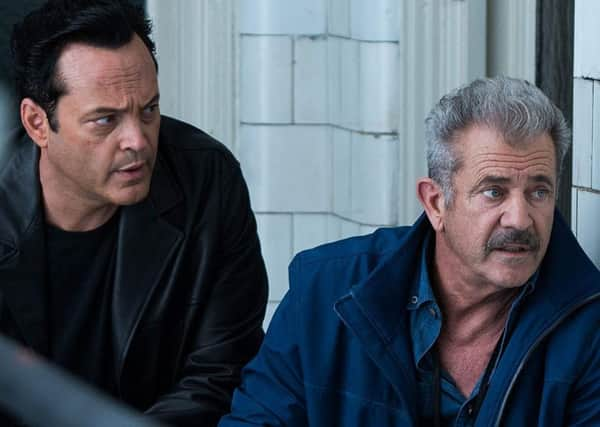Film reviews: Dragged Across Concrete | Greta | Red Joan


Dragged Across Concrete (18) ****
Greta (15) **
Red Joan (12A) **
Cult director S Craig Zahler follows up his cannibal Western Bone Tomahawk and head-stomping prison movie Brawl in Cell Block 99 with a morally ambiguous heist thriller about a pair of racist white cops (Mel Gibson and Vince Vaughn) on a collision course with a black ex-con (Tory Kittles) trying to give himself some options in life. That description – and the casting of Gibson in particular – makes the appropriately titled 160-minute Dragged Across Concrete sound like a deliberately provocative ordeal, which in some respects it is.
But, like Zahler’s previous films, it’s also a meticulously constructed exercise in pure pulp filmmaking, a modern update of the kind of action movies that would once have starred anti-liberal tough guys like Charles Bronson or Clint Eastwood, but which in Zahler’s hands takes the characters and what they represent seriously without endorsing their indefensible actions and attitudes.
Advertisement
Hide AdGibson’s character in particular is presented as an archetype of the tired veteran cop whose inability to play politics has turned him into an embittered workhorse who feels cheated at not being properly compensated for his get-results methods, especially now that those methods are no longer tenable in a world where everyone with a smartphone can police the police. Suspended for excessive use of force, Gibson’s lowly ranked detective, Brett Ridgeman, has a wife with multiple sclerosis and a teenage daughter at home, the latter frequently bullied by the low-income-neighbourhood kids of colour who’ve come to signify for Ridgeman his own downward mobility in an age in which blue-collar white men like him are no longer guaranteed the life they think America owes them.
The film doesn’t use this as a justification for his actions, but as he and his similarly suspended partner Anthony Lurasetti (Vaughn) start staking out a gang of criminals readying themselves for some kind of score (the tip-off he’s received is pretty vague), it does use his social status to interrogate those actions as a way of exposing the misplaced and ultimately debilitating hate coursing through the country.
Languorously paced to maximise the discomfort that comes from spending time with such corrupted individuals, the film shifts back and forth between their perspective and that of Kittles’s Henry, with whom Ridgeman is forced into an uneasy alliance as the heist in which they all become embroiled goes spectacularly wrong – and wrong in ways you can’t see coming, thanks to Zahler’s gift for delivering unexpectedly rich character work and quick bursts of extreme and sudden violence.
The end result isn’t some Trumpian lament for a mythical time when America was righteous and good, it’s a troubling exposé of the futility of that way of thinking which just happens to gets off on the cinematic appeal of vicariously playing out these retrograde fantasies to their fatalistic end point.
Toppling the recent Matthew McConaughey vehicle Serenity as the dumbest movie of the year so far, Greta, the new film from Neil Jordan, is a howler of the “so bad, it’s almost good” variety – emphasis on the “almost”. Starring Chloë Grace Moretz as a recent college graduate whose new life in New York takes a nightmarish turn when she finds a handbag on the subway and returns it to its rightful owner, the film’s fleeting entertainment value comes courtesy of Isabelle Huppert as said handbag’s eponymous owner: a pathologically lonely European emigré who uses the lost-handbag trick to lure naïve young women to her Brooklyn house for home cooking, piano lessons and, should her potential victims grow weary of her unhinged maternal instincts, kidnapping and imprisonment.
Though it’s tricky to tell at which point Huppert realised she’d signed on for such a dud, it quickly becomes apparent that she decided it might be a hoot to be as wilfully terrible and over-the-top as the material deserves (she even ratchets up her own French accent to ’Allo ’Allo levels of silliness). Alas, even if one were to give Jordan – never the most consistent of filmmakers – and his top-level cast and crew the benefit of the doubt by assuming they deliberately set out to make the kind of trashy straight-to-video psycho-thriller that clogged up video shops in the 1990s, Greta is too head-smackingly stupid to give the film a pass, even on those terms.
Advertisement
Hide AdBritish cinema would do well to sever its links with British theatre for a few years, if only to stem the tide of dull respectability that results in dreary films such as Red Joan. Directed by theatre veteran Trevor Nunn, it’s a fictionalised account of the case of Melita Norwood, the so-called “granny spy” who was arrested in the 1990s for sharing nuclear secrets with the KGB 50 years earlier. Pitched as a stiff-upper-lipped female empowerment movie, the film stars Judi Dench as the fictional Joan Stanley, a kindly old lady arrested on espionage charges even though the most radical thing she seems to have done of late is serve her lawyer son tea out of a Che Guevara mug.
As it turns out, Dench is barely in the film; instead, the bulk of the action occurs in the flashbacks to Joan’s days as a Cambridge-educated physicist who takes a job working on the British efforts to develop the bomb (Sophie Cookson plays the young Joan). Though not unpromising as a story, the film drains any interest with staid compositions, shallowly drawn characters and spell-everything-out dialogue. ■